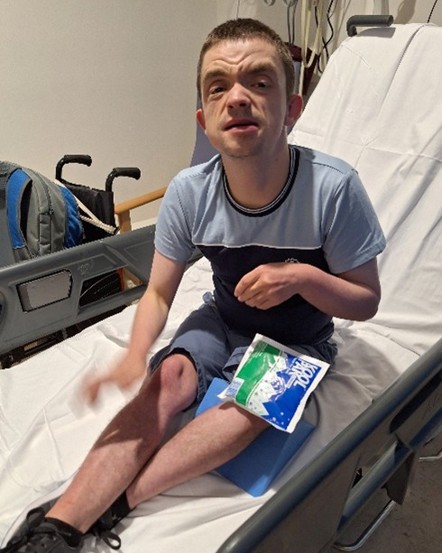Dear Smith-Magenis Syndrome

Tina McGrevy
Tina McGrevy lives in the Midwest with her husband Charlie and their three sons: Garrett diagnosed in 2001 with Smith-Magenis Syndrome (SMS), Patrick ...
It looked like a partying kind of acronym. Not scary at all.
A few years later, the pediatrician escorted my husband and me into the “Disney Room” at his office complex. Naturally, I assumed we were invited to a party. Until he handed us the worst party favor, ever….our son’s genetic test results.
This time, the SMS was short for “Smith-Magenis Syndrome.”
There was no confetti. You were the scariest acronym I ever saw. I would never dance again.
At first, I didn’t want anyone to know about you. You were not going to define us. And it worked so well that you had to rear your ugly head.
You showed yourself in his walk: a strange, wide gait.
You showed yourself in his speech delay: he talked with his hands. You showed yourself in his low muscle tone: he could not color or use scissors.
But most blatantly, you showed yourself in his behaviors. And we could not hide. Not even a little bit. Who could miss the little boy slapping his head and biting his hands?
Even after all of that, you would not let him feel relief. Nope.
You had to take it up a notch. He hit me. He hit his brothers. He hit strangers.
He threw his toys. Or his sippy cup. Or his shoes. He screamed. He slammed his head into any hard surface he could reach: the side of his stroller, the floor, the wall. You were in total control. I had none.
Worse yet, my little boy had no control.
So we had to reach out. To professionals: therapists, doctors and specialists. To educators: administrators, teachers and aides. To other families: special needs groups in our town and the international SMS support group, PRISMS.
Soon, I started rubbing elbows with the famous SMS names, like Dr. Elsea, the discoverer of the gene that causes SMS by mutation or deletion.
And I got to meet the researchers named Smith AND Magenis. In person! And they were kind. And they were caring. And listening to what I had to say.
When Dr. Magenis passed away last year, my husband and I truly felt as if we had lost a member of our family.
That’s just how much we love these researchers. And I will admit, I brag to my friends about how I know these amazing people. Like a groupie hanging onto the bumper of a tour bus, I drop their names: Ann Smith, Ellen Magenis and Sarah Elsea. That’s right. They are women!
I love that the doctors in control of your story are also mothers.
Somehow, that makes me feel stronger. And I am stronger when I talk to the mom who helped establish our support group PRISMS, the SMS moms who serve on the Board of Directors and the women on the Professional Advisory Board.
And I am stronger because of the women who organize the bi-annual PRISMS International Conference and the moms who present sessions; actual SMS lifelines that have guided me through my son’s first 15 years.
And our entire SMS community is stronger thanks to the moms who volunteer as Regional Representatives, contribute to the SMS Journal, “The Spectrum”, or raise SMS awareness in their hometown.
Thanks to you, I have a sisterhood that few others get to experience.
This SMS Sisterhood does define me.
I no longer try to hide you.
The SMS Sisterhood is where I found my control.
Thank you for leading me to them.
I can finally dance again.
Sincerely, Tina McGrevy
For more information about PRISMS, the support network for Smith Magenis Syndrome visit http://www.prisms.org/


